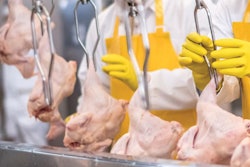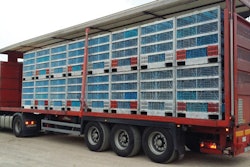
A collection of activist groups filed a lawsuit against the U.S. Department of Agriculture (USDA) Food Safety and Inspection Service (FSIS) challenging the poultry plant line speed waiver system created in 2018.
The lawsuit which lists the Humane Society of the United States (HSUS), Animal Outlook, Mercy for Animals, Government Accountability Project and Marin Humane as the plaintiffs. The suit was filed February 25 in the United States District Court, Northern District of California, San Francisco Division.
The plaintiffs allege that FSIS created the line speed waiver system without providing the public with the legally required notice and opportunity to comment on changes to chicken slaughter line speeds. They also alleged that USDA did not consider how increasing line speeds would affect worker safety, or that possible food safety concerns were not given adequate attention when developing the waiver system.
According to a press release from HSUS, 37 U.S. poultry plants have been granted waivers to operate at speeds higher than 140 chickens per minute.
National Chicken Council responds
Tom Super, spokesman for the National Chicken Council, said the plaintiff claims can be easily refuted.
“This is nothing more than the latest attempt by radical, vegan advocacy groups to try to use the legal system to impose their agenda,” Super said. “Their claims lack any merit and have been consistently rejected by the courts.”
According to Super, the U.S. poultry industry has a long history of producing safe chicken and protecting workers at higher line speeds.
“More than two decades of data, spanning back to the Clinton administration, confirms the safety records of plants operating at higher line speeds,” said Super.
He also indicated the plaintiff’s claims show their limited knowledge about poultry processing.
“The part of the processing line in question – the evisceration line – is almost entirely automated and has nothing to do with the slaughter of the birds.”
Super also refutes the claims of a lack of notice or ability for citizens to comment, saying USDA published detailed criteria for the waivers in the Federal Register and through the FSIS Constituent Update.
Regarding their claims of compromised food safety, Super said chicken has never been safer to eat.
“Salmonella rates on chicken are at all-time lows, as are key safety metrics for chicken processing employees,” he said.


















